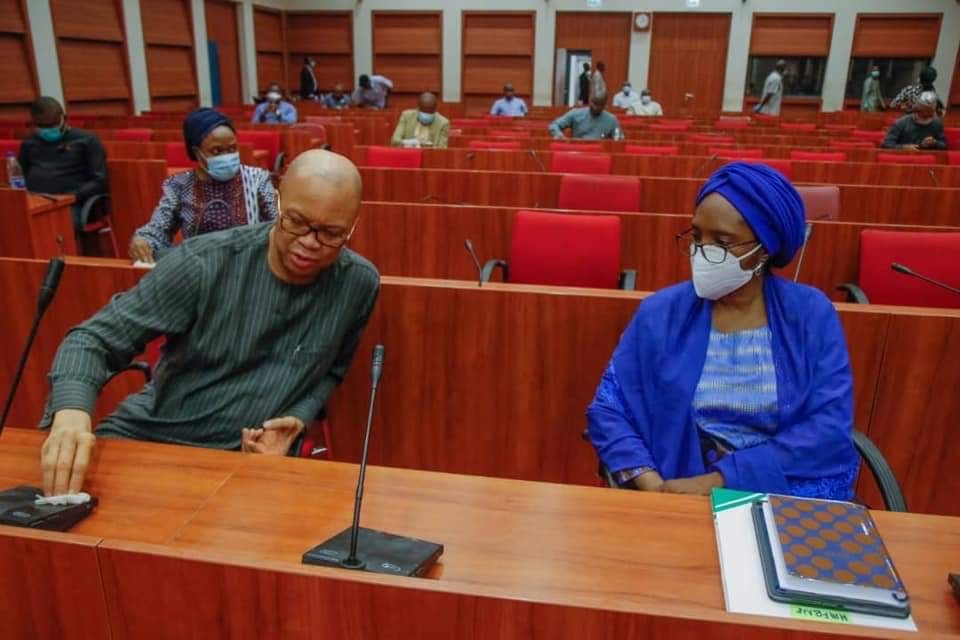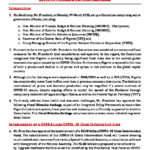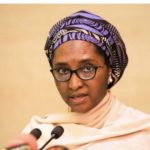The Federal Government is considering the option of revising the benchmark oil price for 2020 to US$30/barrel and oil production to 1.7mbpd, having also been compelled to revisit the 2020 Appropriation Act which was based on certain fiscal assumptions, given the emerging economic realities caused by dwindling international oil prices and the COVID-19 pandemic.
Mrs. Zainab Ahmed, Honourable Minister of Finance, Budget and National Planning, in a ministerial press statement on fiscal stimulus measures in response to the COVID-19 pandemic and oil price fiscal shock in Abuja, stated: “Specifically, projected oil revenues have been significantly affected in that dated Brent oil prices fell to as low as US$19.125/barrel (03.04.2020) as compared with the 2020 budget benchmark of US$57/barrel; and oil production in 2020 year-to-date is 1.9mbpd (before the current crises) as compared with the 2020 budget’s projection of 2.18mbpd.”
“We are therefore revising the benchmark oil price for 2020 to US$30/barrel and oil production to 1.7mbpd. We have similarly had to adjust downwards our non-oil revenue projections, including various tax and customs receipts, as well as proceeds of privatisation exercises. In this regard, the Budget Office is currently working on amendments to the medium-term expenditure framework (MTEP 2020-2022) and the 2020 Appropriation Act.
“The proposed amended budget will provide for the N500 billion COVID-19 Crisis Intervention Fund and other adjustments required, due to the decline in international oil prices. We have also commenced consultations with the leadership and key Committees of the National Assembly to discuss our plans, such that once the Executive’s 2020 Amendment Budget is completed, we shall expeditiously seek presidential and legislative approvals for this revised appropriation.”
In order to address the emerging fiscal risks, as a result of the drop in the international oil prices and global outbreak of coronavirus (COVID-19), President Muhammadu Buhari has given a number of approvals. He approved the establishment of N500 billion COVID-19 Crisis Intervention Fund.
Apart from the proposed N500 billion intervention fund being meant to upgrade healthcare facilities as earlier identified by the Presidential Task Force on COVID-19 and approved by Mr. President, the fund is also to finance the federal government’s interventions to support states in improving healthcare facilities; finance the creation of a special public works programme; and fund any additional interventions that may be approved by Mr. President.
Ahmed said, in addition to the identified special accounts from where the money will be drawn as loans, the proposed intervention fund is also expected to be sourced from grants being expected and loans from international development partners, the Multilateral Institutions.
Regarding the special public works program, “Mr. President had previously approved a pilot special public works programme in eight (8) States to be implemented by the National Directorate of Employment (NDE) from February 2020 to April 2020. Mr. President has now approved that this Programme be extended to all 36 States and the FCT from October 2020 to December 2020,” Ahmed stated.
On the chosen timeframe, she said: “It is to ensure that the programme is implemented after the planting season, and this will result in the employment of about 774,000 Nigerians (that is, 1,000 people per local government). There will be N60 billion in allowances and operational costs earmarked from the COVID-19 Crisis Intervention Fund for this initiative.”
The Federal Ministry of Finance, Budget and National Planning and the Federal Ministries of Works and Housing, Water Resources, Environment are also to evaluate how best to extend the public works programme, to provide modest stipends to workers, to undertake roads rehabilitation, social housing construction, urban and rural sanitation, health extension, and other critical services. This intervention, according to Ahmed, will be undertaken in conjunction with the States to financially empower individuals who lost their jobs due to the economic crisis.
Considering the involvement of the National Assembly, the Honourable Minister of Finance, Budget and National Planning stated that further details regarding the operation of the N500 billion COVID-19 Crisis Intervention Fund would be announced once the consultations with the National Assembly are concluded.
Speaking on the enhanced financial support to the states for critical healthcare expenditure, Ahmed also stated: “The government has provided N102.5 billion in resources to be available for direct interventions in the healthcare sector. Of this sum, N6.5 billion has already been made available to the Nigeria Centre for Disease Control (NCDC) for critical expenditure. More funds are to be provided from the proposed crisis intervention fund to address emerging and priority funding needs as these arise.”
“The federal government remains committed to supporting the states in these difficult times, particularly those states that are currently battling with the COVID-19 pandemic. Lagos State has already been provided N10 billion in emergency funding. As the situation in the FCT and other states at the forefront of our efforts unfolds, explicit criteria are to be agreed with the Federal Ministry of Health and the NCDC to determine when funds would be released to the affected states and the FCT,” she stated further.
To complement the initiatives, she said that “government is taking steps to activate, release and (where necessary) enhance the hazard allowances provided in the remuneration structure of the federal health sector workers. The federal government enjoins the affected states to take similar measures.
“We take this opportunity to recognise the patriotism and sacrifice of our frontline healthcare workers, whose critical roles in combatting the COVID-19 pandemic place their health and lives at risk. We thank all of you for your heroic efforts to protect your fellow citizens from disease and death. The federal government hereby assures our frontline healthcare workers of adequate insurance, compensation and support during and after the COVID-19 pandemic.
On the emerging health and economic risks as a result of the COVID-19 pandemic and decline in international oil prices, the Honourable Minister also noted that they all have posed significant threats to Nigeria’s economy, the healthcare system, national security, as well as the lives of Nigerians. She assured that, accordingly, extra-ordinary measures would be required, as the situation evolves, to address the challenges.
Stating the need for collaboration, she said: “We will continue to work closely with our colleagues at the Ministries Trade and Investment; Petroleum Resources; and Health; as well as the CBN, to pursue greater coherence and coordination of Nigeria’s fiscal, monetary as well as trade policies, during the difficult days and months ahead. The Economic Sustainability Committee, chaired by the Vice President, Professor Yemi Osinbajo, will continue to coordinate our efforts and strategies, as well as provide regular updates to Mr. President.






